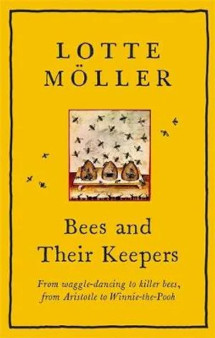Bees and their keepers by Lotte Moller, translated by Frank Perry

MacLehose Press, 2020. ISBN: 9781529405262.
(Age: Senior secondary / Adult) Highly recommended. "Through the
seasons and centuries, from waggle-dancing to killer bees, from
Aristotle to Winnie-the-Pooh" - the subtitle gives an idea of what
the book is about. It is not a how-to guide but more a social and
cultural history of beekeeping. That said, Moller, the author, did
keep bees herself for many years, and she has included factual pages
on the life cycle and duties of the bees within the hive. There are
also chapters on enemies of bees, pests and diseases, all things
beginning beekeepers would be advised to learn about.
The first section of the book is full of historical references to
past beliefs about bees and beekeeping. It is the kind of book that
you can just pick up and read something interesting from any page
but the true enthusiast will be rewarded by reading from beginning
to end. Readers will learn about early hives, the surprising
discovery that the bee community is centred around a queen not a
king, remedies for stings, stories of swarms, the different
varieties of honey, and the development of the Buckfast bee. This
section of the book is ordered by months of the year, but southern
hemisphere readers need to remember that the author, being Swedish,
is referring to a northern hemisphere calendar.
The second, shorter, section of the book raises current issues in
beekeeping - questions about the best kind of hive, Langstroth,
Warre or top-bar hives, 'natural' beekeeping and arguments about
original or hybrid bees. However readers will find no mention of the
Australian invented Flow Hive - perhaps the uptake in Europe has not
been as high as in Australia, U.S. and Canada.
There is much people can learn from bees, yet as Moller says, we
have made things so difficult for them that their very survival is
now in doubt. Keeping bees has had a groundswell of interest from
urban beekeepers and hobbyists, but this does not solve the
pollination problem in our agricultural industries based on
monoculture cultivation and widespread insect sprays. Perhaps
reading about past discoveries and innovations will inspire future
problem solving and a renewed appreciation of the amazing
contribution bees make to our world.
Helen Eddy